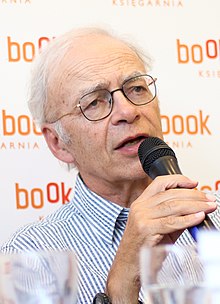Peter Singer | |
|---|---|
 Singer in 2017 | |
| Born | Peter Albert David Singer 6 July 1946[2] Melbourne, Victoria, Australia |
| Education | |
| Notable work |
|
| Political party | Greens |
| Spouse |
Renata Diamond (m. 1968) |
| Children | 3 |
| Awards | |
| School | |
| Institutions | |
| Thesis | Why Should I Be Moral? (1969) |
| Academic advisors | R. M. Hare (BPhil advisor) |
Main interests | |
Notable ideas | |
| Website | petersinger.info |
Peter Albert David Singer AC FAHA (born 6 July 1946) is an Australian moral philosopher who is Emeritus Ira W. DeCamp Professor of Bioethics at Princeton University. Singer's work specialises in applied ethics, approaching the subject from a secular, utilitarian perspective. He wrote the book Animal Liberation (1975), in which he argues for vegetarianism, and the essay "Famine, Affluence, and Morality", which argues the moral imperative of donating to help the poor around the world. For most of his career, he was a preference utilitarian. He revealed in The Point of View of the Universe (2014), coauthored with Katarzyna de Lazari-Radek, that he had become a hedonistic utilitarian.
On two occasions, Singer served as chair of the philosophy department at Monash University, where he founded its Centre for Human Bioethics. In 1996, he stood unsuccessfully as a Greens candidate for the Australian Senate. In 2004, Singer was recognised as the Australian Humanist of the Year by the Council of Australian Humanist Societies. In 2005, The Sydney Morning Herald placed him among Australia's ten most influential public intellectuals.[3] Singer is a cofounder of Animals Australia and the founder of the non-profit organization The Life You Can Save.[4]
- ^ "Animals and Ethics". Internet Encyclopedia of Philosophy. Archived from the original on 1 March 2022. Retrieved 27 October 2018.
- ^ Duignan, Brian (2 July 2023). "Peter Singer". Encyclopædia Britannica. Archived from the original on 10 July 2022. Retrieved 11 July 2022.
- ^ Visontay, Michael (12 March 2005). "Australia's top 100 public intellectuals". The Sydney Morning Herald. Archived from the original on 19 December 2021. Retrieved 27 October 2018.
- ^ "The Life You Can Save". Archived from the original on 21 September 2023. Retrieved 25 April 2019.